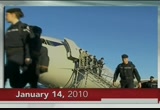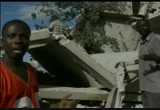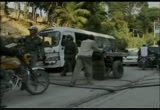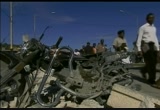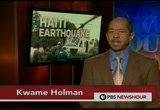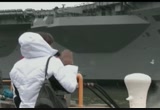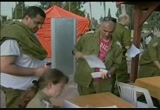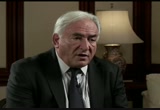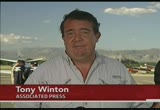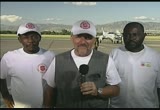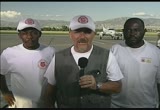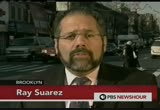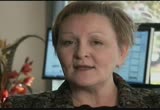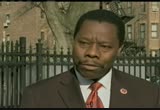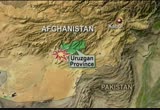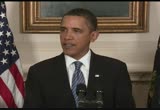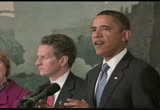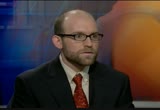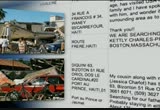tv PBS News Hour PBS January 14, 2010 6:00pm-7:00pm EST
6:00 pm
captioning sponsored by macneil/lehrer productions >> lehrer: good evening. i'm jim lehrer. unimaginable death and destruction in haiti. >> woodruff: and i'm judy woodruff. on the "newshour" tonight, the death toll could be as high as 50,000 with a further three million people injured or homeless. >> lehrer: we'll talk with former president clinton-- the u.n. special envoy to haiti-- about the catastrophe that came just as haiti seemed to have turned an economic corner. >> woodruff: plus, we get first hand accounts of the relief situation on the ground.
6:01 pm
>> lehrer: and some perspective on the global humanitarian effort from the president of care, helene gayle. >> woodruff: then, president obama's new plan to tax big banks to reimburse taxpayers for the federal bailout. >> lehrer: that's all ahead on tonight's "pbs newshour." major funding for the pbs newshour is provided by: ♪
6:02 pm
we see beyond cars. >> this is the engine that bnsf, the engine that connects us. >> chevron. this is the power of human energy. and by the alfred p. sloan foundation. supporting science, technology, and improved economic performance and financial literacy in the 21st century. and with the ongoing support of these institutions and foundations. and... this program was made possible by the corporation for public broadcasting. and by contributions to your pbs
6:03 pm
station from viewers like you. thank you. >> lehrer: there were scenes of mounting desperation in haiti today amid frantic rescue attempts and halting relief efforts. as bodies piled up, the red cross estimated 45,000 to 50,000 dead from monday's earthquake tragedy. they included at least one american and 36 u.n. peacekeepers. "newshour" correspondent kwame holman begins our coverage. >> reporter: 48 hours after the earthquake, port au prince was a city crying for help. countless people were still trapped-- in thousands of pancaked schools, hospitals, homes and offices across the haitian capital. >> that was my father's house, so we lose it, my mother was... >> now we have somebody here.
6:04 pm
>> there is some person inside the house. >> we can't find him, we don't have a loader, digger to take them out. >> reporter: people worked through a second night and day, digging out debris with their bare hands to uncover survivors. one group of people used a car jack and the light of a camera crew to free a trapped woman. and an american rescue team joined the search at the wrecked headquarters of the u.n. peacekeeping force. some 200 people remained missing there. those who did survive struggled to get help. but hospital and aid workers reported supplies were running out and the prime minister issued an urgent appeal. >> ( translated ): we are going to need water, food and medicine, because there are a lot of people injured and we have not yet found all those people buried under their houses. and as we continue with this work, we will need a lot of medications and a lot of help. >> reporter: for now, injured victims were carried on makeshift gurneys made from
6:05 pm
doors or in wheelbarrows to the few hospitals still standing. tents were set up, and others of the injured were being treated in parking lots, including some foreign aid workers. >> we had an eye clinic in, run by a dallas church and the church down here. and our clinic building was collapsed-- concrete building, concrete roof. and it injured five of us, some of use more severely than others, she's the most severe. >> reporter: 60 miles outside the capital, workers at the hospital of the immaculate conception, struggled to keep up with patients pouring in. >> this is blood all over the floor. >> reporter: a pastor at a nearby church shot this video showing some of the injured being treated. many had head wounds and broken limbs. some of the injured, turned away from the overwhelmed hospitals, had to spend the night in their
6:06 pm
cars. they faced a rising risk of infection and complications from broken bones in 90-degree daytime heat. the danger of disease was heightened by growing numbers of bodies in the streets. the morgue at the general hospital was full by morning, 1,500 bodies were placed outside, with more coming in. tent cities grew, filling up with thousands of people who lost their homes in the quake. others were to fearful of aftershocks to seek shelter indoors. >> having another aftershock, and people are waving their hands as the ground shakes. >> reporter: one of the largest camps was set up across from the crumbled presidential palace in the heart of the city. some people even slept on roads outside their houses, but they faced danger, amid reports of looting and shots being fired. there was little evidence of the city's police force.
6:07 pm
many haitians also began walking out of the city to reach rural areas that had sustained less damage. they had to cross roads made nearly impassable by rubble, twisted buses and cars, crushed by falling buildings and other debris. these images from a security camera showed the moment the 7.0 quake wrecked the city tuesday afternoon. a satellite image released by "geo-eye" gave stark evidence of the scale of the damage in port au prince, a city of two million. but among the rubble, there also were signs of resiliency. this group of survivors set up a spontaneous prayer service today. and evacuations of foreigners were continuing. by late today, more than 160 americans have left the country, with another 360 scheduled to go. about 45,000 americans were living in haiti when the earthquake struck.
6:08 pm
inside haiti, and overseas, the urgent effort to get in heavy lifting equipment and medical supplies escalated today. but logistical challenges were daunting. with power out, communications barely functioning and facilities overwhelmed. as the day began, humanitarian flights arrived at the port-au- prince airport. french aid workers applauded when their plane touched down. it brought a team of 65 specialists in clearing rubble and their six sniffer dogs. the french foreign minister spoke in paris. >> ( translated ): our three planes that arrived in haiti via martinique have landed with an impressive number of rescue teams. firstly, a team from the civil security, with the means equipment to search for survivors in the second plane and medical equipment, with doctors and nurses, in the third plane. >> reporter: flights from china, spain and the u.s. also landed. the chinese cargo taking six
6:09 pm
hours to unload because of a shortage of needed equipment. incoming planes began to circle overhead, and by midday, the airport ran out of space on the tarmac and fuel. for a time, all flights from the u.s. to haiti were halted. air shipments of aid resumed later in the day. in washington, president obama called the haiti crisis a moment for american leadership. he announced an initial installment of $100 million in help for the country. >> this will mean more of the lifesaving equipment, food, water and medicine that will be needed. this investment will grow over the coming year as we embark on the long-term recovery from this unimaginable tragedy. >> reporter: the first wave of the u.s. effort involved a detachment of some 100 soldiers from the army's 82nd airborne division. they left fort bragg, north carolina today. their main task is to prepare for the arrival friday of more than 800 other u.s. military personnel. and thousands of additional u.s.
6:10 pm
troops are expected to head to haiti in the coming days. at the same time, the president warned a relief effort of this magnitude will not happen all at once. >> even as we move as quickly as possible, it will take hours, and in many cases days, to get all of our people and resources on the ground. >> reporter: underscoring the u.s. commitment, secretary of state hillary clinton cut short her trip to asia to return to washington. but she acknowledged huge logistical hurdles facing the relief mission. >> when you're on the ground and see the roads that are totally impassible, an airport that was knocked out of commission, no air traffic control, trying to piece together the step-by-step patient work that is necessary to minimize the loss of both life and to try to get people back into some semblance of normalcy is just very hard. >> reporter: some civilian teams already were in action, including a search and rescue squad from fairfax, virginia.
6:11 pm
its members arrived late last night and immediately began to assess the damage. >> the ride here was devastating, early this morning, obviously, we had the first chance to see wh was happening over the whole entire this side of the entire country and it was amazing. >> reporter: despite the logistical problems, british rescuers were expected to arrive today. packed boxes of aid supplies for the victims. prime minister gordon brown. >> i can say that our 64 firefighters, who were flown out urgently with the help of gatwick airport being open for that to happen, together with 10 tons of lifting equipment to help, and search and rescue dogs, have arrived in haiti, in port-au-prince and will be working immediately to help get >> reporter: in israel, a military delegation was heading to haiti to erect a field hospital in the disaster area. the facility could treat 500 patients each day with 40
6:12 pm
doctors, 25 nurses, surgical facilities, and a pharmacy. >> israel has quite a lot of experience in these kinds of earthquakes. we have been in several places in the world. we're bringing our knowledge and we're coming to assist the people over there and to save lives. as fast as we could we will be over there. >> reporter: australia came forward with financial support. >> australia will provide initially 10 million australian dollars worth of assistance to haiti. five million dollars of that will be allocated immediately for emergency humanitarian assistance. >> reporter: and the international monetary fund pledged $100 million in emergency financing for haiti. the i.m.f. managing director also called for new long-term approaches to the country's chronic needs. >> probably, we will need to do something totally new with haiti at the national level and try to define a global plan to help the recovery of the country, because it's obvious now that the
6:13 pm
piecemeal approach-- one crisis after the other-- is not enough to get rid of the problems of the country. >> reporter: in fact, the red cross estimated three million people in haiti will need aid of some sort, many of them for a full year. >> woodruff: now for what it is like on the ground in haiti. i spoke earlier with a reporter and an emergency relief coordinator for the salvation army. first, tony winton, a broadcast reporter for the associated press. tony winton, thank you very much for talking with us. we're now a full two days into this. how would you describe the situation? >> it's still pretty grim and grave. there are still bodies lying in streets. we saw a makeshift grave operation on a hillside in port-au-prince where people were burying people in shallow graves, perhaps just a foot deep. meanwhile, people are still living out in the open under tent cities that have popped up
6:14 pm
all over the town, fearful of getting inside. >> woodruff: do you have a sense of how many people are still alive under the rubble of the collapsed buildings? >> we have seen a few places where there is a frantic activity by haitians trying to get someone out. but for the most part, a lot of these collapsed structures, there's no activity going on. it doesn't mean there's not anyone alive there, there just isn't something we can see . >> couric: to what extent is there enough equipment, enough people to get to the people still trapd? >> it would be hard for me to assess that. i know we've seen large contingents of trained urban rescue professionals come in such as the ones from miami-dade and los angeles that came into port-au-prince today. they certainly have the skills. one of them told me it's not uncommon to have a rescue as late as seven days after an earthquake. >> woodruff: tony winton, what are you focusing your reporting on now? >> well, today we were focusing on the relief efforts, the
6:15 pm
delivery of basic supplies. we were in one neighborhood where after two days finally a water truck showed up and hundreds of haitians came out with pails to have the truck fill them up. in true haitian fashion, a little entrepreneurship, someone set up a fried doug stand next to the water truck so that was a scene where people were trying to make the best of it. >> woodruff: tony winton with the a.p., we thank you for talking with us. i'm talking now with bob poff with the salvation army there in port-au-prince. mr. poff, what is your main challenge right now? >> the main challenge is getting the vital u.s. is innocent that the people need. we need to get them food and water, we need to get them some shelter and we need to get them to them quickly. we need medical first aid as well. we're seeing hundreds of people coming to our compound that need medical assistance right away and we're out of supplies. so we need it desperately . >> woodruff: and what are you hearing in terms of when this
6:16 pm
materiel is going to be there? >> the first plane is due to arrive any minute, actually. they've had some difficulties getting into the airport as well. we haven't actually seen them yet, so they're not on the ground as far as we know, but hopefully any minute now we're going to get word that our first plane with some food, water, and medical supplies has arrived. >> woodruff: for you, for someone who has been living in haiti, what are you seeing of the people around you? >> i'm seeing several things that really amaze me. i'm seeing people who are very, very strong, who are very courageous. i'm seeing them fight against all the things that have happened to them with this devastation. and then i'm seeing a number of people whose bodies have been banged and bruised. one boy came to our compound today with his hands severed and the bone sticking out of his arm and yet not a whimper. the boy wasn't crying, he wasn't scheme screaming. i know he'd been like this for a
6:17 pm
few days and he came... they finally brought him to us in that terrible condition. so, yes, it's a very difficult situation. yes, people are very anxious. they need to know if they're going to have food and water in the coming hours. but i see people who are also quite strong and quite willing to do what it takes to make a difference. >> woodruff: bob poff with the salvation army. thank you. >> lehrer: for the record, i misspoke earlier when i said the earthquake happened monday night, obviously it was late tuesday afternoon. now one more perspective from port-au-prince. earlier today, hari sreenivasan spoke via skype to matthew marek head of programs for the american red cross in haiti. he started by asking him what challenges the organization faces. >> what we're expecting over the next few days are our emergency response unit teams, medical, telecommunications, logistics relief units and whatever supplies we can identify the population need. right now it what's most important is what's happening in the search-and-rescue sectors. a lot of the population and
6:18 pm
family and neighborhoods are trying to get still wounded victims out from under rubble. one of the major concerns is that all of the international community has, including the red cross, is also to tend to the deceased which are very sadly littering the streets of port-au-prince right now. >> sreenivasan: which causes a larger health concern for the population that's still alive. >> absolutely. and we have to take that into consideration immediately for our short-term relief efforts and our long-term planning. the population needs to be concerned with that as well. >> sreenivasan: where are people getting their water? >> there's... that's a very good question. wherever they can get their water from . it's right now in haiti's economy there's a large informal sector on a lot of the small market women that occupy the
6:19 pm
streets and the market kiosks on the side of the road. i would assume that a lot of their stocks are dwindling where haitians would normally go to for water and drinks and small food idems. a lot of the larger markets have been destroyed by the earthquake we can assume that a lot of the warehouses that have housed shipments of food prior to the earthquake that normally are imported into haiti have also incurred a lot of damage. people are very desperate. very desperate right now for everything, for food, for water. and they're holding out right now. they're holding off right now. >> sreenivasan: how are you planning to get supplies in? we're hearing about damaged ports. >> right. the news is reporting that the port itself is damaged. that's accurate. the airport is reporting that the tow tower is out, but it's become worked on, if it hasn't
6:20 pm
already been worked on. as we've seen news reports as well that landing in the country on the... in the tarmac is possible but it's going to be a very difficult regarding traffic, air traffic control at this point. a lot of cargo planes are coming in and that is going to be the main source of getting things into the country right now until other routes can be established. >> woodruff: >> woodruff: next, the cruel irony of the earthquake's timing. this is not the image haiti had been projecting to the global community in recent months. the earthquake that has plunged the country into chaos comes just as haitians appeared to be making progress in their long struggle to overcome political turmoil and deeply-rooted poverty. >> haiti was no longer the place where people are kidnapped by the score every month. it is no longer a place where armed people drive around in vehicles shooting up the town. >> woodruff: in a report broadcast on the "newshour" just three days ago, the u.s.
6:21 pm
ambassador to the country was one of those who told special correspondent kira kay that facts on the ground in haiti were beginning to improve. >> reporter: the task of rebuilding haiti is undeniably huge. more than half its people live on just a dollar a day. public services like health care and a free education are almost nonexistent. >> somebody say that we just want to get out of misery to get into poverty. and i believe that is a beautiful sentence for haiti, because it is exactly what we are aiming for right now. >> woodruff: former president bill clinton-- the u.n.'s special envoy to haiti-- was recently promoting investment opportunities in the country. >> we know that this is a great opportunity not only for investors to come and make a profit, but for the people of haiti to have a more secure and a more broadly shared, prosperous future. >> woodruff: that kind of high profile support was keeping haitian businessman georges sassine busy. the local point person for new
6:22 pm
investment, his phones didn't stop ringing, even during his interview with kira kay. >> i have to be like a dispatcher, investors from brazil, from ireland and from korea coming one after the other. so it's been very hectic, believe me, but it's a good, it's a good problem to have. >> woodruff: but tonight, haiti is no longer blessed with good problems. and former president clinton-- along with former president george w. bush-- has a new role after agreeing to a request from the obama administration to assist the relief effort. >> lehrer: and former president clinton joins us now from his office in new york city. mr. president, welcome. >> thank you, jim . >> lehrer: mr. president, what's it going to take for haiti to survive this trapblg stkpheufrpblgts well, first i think the whole world is pulling for them but we need to recognize that the most urgent
6:23 pm
thing we can do now is get them through the next week to ten days. we have to find the living and the dead and we have to take care of both. unless someone is part of a search-and-rescue team or a medical team, the best thing they can do for the next week to ten days is send cash, even if it's five or ten dollars, because what we need is food, water, medical supplies, shelter the united states military has done a great job of taking over the airport. they're working closely with the u.n. security forces, the state department and aide are working very well and thank goodness the american embassy was unharmed. but the government has been damaged and our u.n. office has been december mitted there. we still have 150 people buried who have not been found. we did get someone out alive today, thank god. but we need to focus on this now. i set up
6:24 pm
a... for my u.n. office, a web site that's clintonfoundation.org /haiti earth quake just to move money into medical supplies and the last day we've gotten something like $4 million and we've gotten people sending less than a hundred dollars on average. or they can text "haiti" to 20222 and give $10. that's the most important thing now. then when that's over, we'll have to complete the relief efforts and we'll start recovery and reconstruction. haiti has a plan. it will have to be amended to take account of what has happened. but we'll have the government reconstitute it soon, we'll have the u.n. mission reconstitute it soon. i talked today to haiti's other main donors on the phone. they're still committed. i met with 50 of the big nongovernmental organizations and investor groups that had promised to help, they're still committed. but we've got to get them
6:25 pm
through the trauma of these next few days first. >> lehrer: who's in charge of all of this, mr. president? is the haitian government able to manage all of this that you've just described or is somebody else going to have to do it? >> well, the problem is, we're doing it sort of one thing after another now in a cooperative way because the haitian government, the presidential palace was destroyed, the parliament building was badly damaged. they're still missing senior members of parliament. they're still missing ministers of the government. and the u.n. in all probability had its greatest loss of life in the whole history of the united nations. we still have 150 people under the rubble unaccounted for. so the americans have been great, from the president on down. i can't thank them enough. and we are working... the u.n., mr. edmund nutelle, who who was the predecessor of the current head of our mission has gone down for the next couple days.
6:26 pm
he's going to have to worry about pulling people out of the rubble. then we'll stand up the u.n. again. we've got some working space for the president and prime minister around the airport and i'm staying on the phone here trying to take one issue after another along with my deputy dr. paul farmer, whom you know, who's worked in haiti for 25 years. >> lehrer: sure. >> and we're trying to deal with these things one after another. i don't know that anybody's in charge but everybody's trying to be pretty responsible and we're working hard at this. >> lehrer: do you have the feeling at this point that the will is there in all of these dispirit groups and entities to get these people found and do all of the... not the long-term reconstruction but the immediate work that needs to be done? >> yes, but there are significant just practical problems. for example, the port's capacity is badly damaged because they can't lift things off of ships. so if we're going to bring in things by boat, we've got to be
6:27 pm
able to lift off the things by boats either by putting them in a smaller boat and taking them to shore and lifting them up or having the crane capacity on the ships itself. we have an enormous amount of really good equipment that's capable of moving debris and clearing streets, but it was put to use primarily clearing out the clogged waterways in haiti. so a lot of it wasn't available and now they can hardly navigate the streets to get there. so these physical problems are going to be dealt with one by one by the u.n. forces there that are largely whole, the military forces, and by the american military helping them and others coming in. the chinese have sent a search-and-rescue team, the russians are sending two big helicopters, people from all over the region are helping. and there's a remarkable spirit there of just trying to save as many lives as possible and care for the people that are wounded and meet basic human needs. we'll just have to work through this. but everyday five new things come up that we just have to fig
6:28 pm
out who to call for help and how to deal with them. >> lehrer: well, like the airport problem. there were 11 planes circling for a long time and they finally closed the airport for a while because these planes that had all these kinds of things that you were talking about-- plus people-- couldn't land. has that been resolved, do you think? or can it be resolved? >> well, i don't think it can be resolved entirely. we have airport delays at very sophisticated big american airports. what happens is more planes want to land than can be landed in an orderly fashion right now. i just hope that people that want to bring those planes in there understand that right now all they need search-and-rescue teams, medical teams, and food, water, medical supplies and shelter . and we're trying to do some more on the protection and figure out what we can do to get some lighting there at night. but that's it. we've got to get through this emergency period. then... and somewhere, a week
6:29 pm
from now, ten days from now, we'll be more concentrated on removing the debris that's not covering human beings. and then we'll begin to implement the plan again. and by then we'll have the haiti government reconstitutes. we'll have the u.n. reconstitutes. this is... i don't think... it's very hard to imagine what happened here. i mean, our u.n. office s in a hotel that collapsed, five stories, there's still 150 people who are buried under that debris. people that we all knew and worked with. and haitian families are still trying to figure out what happened to their family members. we've got bodies and no refrigeration capacity, haitians bury their dead. i hope that we can get some refrigeration ships and some other capacity there with generators that will operate so we can preserve as many people who have been killed for their loved ones as possible, otherwise public health demands will require mass burial and all
6:30 pm
we'll be able to do is take pictures and let people know where tear loved ones are. this is a big problem. >> lehrer: sure. mr. president, i know it's hard to look ahead at this point, but based on your intimate new jersey knowledge of haiti, for years now, and your position as the u.n. special envoy, when you look ahead, once you get past these first phases that you were talking about, do you believe that haiti can, in fact, move through this and survive and follow the plan that you and others have devised? >> yes, i do. i do because... >> couric:. >> lehrer: what tk *euf ... gives you the confidence? >> several things. number one, the haitian government has greater capacity than ever before. number two, the haitian diaspora community is committed to helping and they are more welcome than ever before. the parliament just approvalled dual citizenship for the haitian diaspora. keep in mind, look at the united states, haitian americans are approximately 1% of our african american population, 11% of our doctors. we've got haitian americans who
6:31 pm
are dieing to go down there and invest and build a future. the third thing is the neighbors of haiti care more than ever before. when i restored president aristide 15 years ago in 1995, argentina was about the only neighbor that really cared at the time. now when we had an investment conference there, there were more people there from latin america and the caribbean and from the u.s., canada, france, all of europe and all of asia combined. they care. and finally, we have the inter-american development bank, the world bank, and the whole u.n. system totally committed to this and, again, i can't say enough for the commitment that president obama has made. and, you know, hillary canceled her trip to asia to come back and work on this. we've loved haiti for 35 years now. she's... she's distraught about it, but committed and on the job, staying there all weekend to work. the a.i.d. director, mr. shaw,
6:32 pm
is doing a good job e. we're going to get through this and i think there will be even more determination to honor the plan they have... it's not my economic plan, it's theirs. their government has embraced it. but we've got to help them with the living and the dead right now. and if we do this right and they feel the support of people around the world and next door, then i think you will see us resuming at an even more rapid rate the implementation of this plan. >> lehrer: all right. mr. president, thank you very much for talking to us. >> thank you, jim. >> woodruff: and for a larger look at the humanitarian effort underway in haiti, we are joined by doctor helene gayle, the president and ceo of "care usa." care has worked to help people in haiti since 1954. dr. gayle we just heard former president clinton saying he didn't know if anybody was in charge. we're seeing wire reports from
6:33 pm
haiti that people who are frustrated that no aid is getting in are setting up roadblocks with corpses in the roads. what is your sense of why it's taking so long to get help? >> well, i think several of the speakers, including president clinton, have made clear how chaotic and how difficult the situation is right now. just the very physical infrastructure that has been destroyed makes it difficult to get this really launched in the way that it needs to be. and that's why, you know, it needs to be taken in a step-wise fashion. first of all, clearing some of the rubble, the debris, making it possible to pass through the country, get supplies in, rehabilitate the portment all these things are going to be necessary to make this a more orderly recovery period. but i think, you know, what is
6:34 pm
good is that there is a commit ment. the airport is now getting... has started to let planes in. people are coming in through the neighboring country, through dominican republic. and so i think that it won't be very long before we see this taking shape and being able to start a much more orderly process of responding to this incredible emergency. but i think it's hard to underestimate how difficult it is with all the infrastructure that's been destroyed. >> woodruff: so from your perspective through care, what are the greatest needs right now? >> well, i would just reiterate what everybody has said. i mean, the most important is immediate ly the search-and-rescue and making sure we're able to provide emergency support to those that are still living. the first 24, 48, 72 hours are the most critical period of times to get food , water,
6:35 pm
shelter, making sure that we can do what we can to prevent further death. then it's also important, as has already been emphasized, that we try to do what we can for the dignity of those who have already died. so i this i if we really look at this as providing support to those who need it most urgently, those who are still living, medical supplies, medical needs. people have been injured. there are people who are very, very close to having catastrophic emergency needs who already have catastrophic emergency health needs that need to be taken care of. so i think looking at those emergency issues and then also tending to those who have already been deceased. and then looking at what is it going to take to slowly look at a recovery rehabilitation phase and do that as expeditiously as possible. care as well as other organizations that already have people on the ground are able to
6:36 pm
start the response quickly. we have 130 people and, as you said, we've been there for over 55 years. so we were able to take things that are already in our warehouse there, start distributing food. we're giving out food particularly to the most vulnerable women and children who are at greatest risk of malnutrition in this situation. so we want to make sure that we are doing what we can with what we already have available. we're deploying people to haiti rapidly. we're starting to send in supplies from neighboring countries like panama where we have resources and warehouse and things stockpile there had and try to get this out to people as quickly as possible. >> woodruff: so is there now the kind of coordination that you think that it requires? and just quickly, second of all, for those people who are watching, what would you add to what president clinton said, that right now what's needed is money? >> well, first, i would underscore that. what's needed right now is, in fact, money.
6:37 pm
resource so that we can continue to bring in the kinds of supplies, bring in the kinds of support that's necessary. everybody... you know, people have been so incredible about wanting to get on planes and get there and do something and physically participate. but that's not necessary or it's not even possible right now with the destruction of the infrastructure that everyone has talked about. but what is needed right now are resources. $5, $10, it really doesn't matter. it all helps. and so we would just continue to encourage people to do that. know the coordination is not yet what it needs to be, but i think that people recognize through the experience of things like the tsunami that we can not risk having this be chaotic and having this not be done in a way that brings organizations together in a coordinated fashion. so i really do think that we have the opportunity to do this better, do this better than we have in the past. i think people recognize that that we need to do this in a
6:38 pm
unified fashion, let each one do what they do best so that this comes together in a way that really does the most to help and support the haitian people and the haitian government, which does have the ability once it gets back up on its feet, as president clinton said, to really help to lead this response. >> woodruff: helene gayle with care u.s.a., thanks very much. >> thank you, judy. >> lehrer: the past three days have been difficult for haitian americans who are waiting for news and who are trying to provide help. ray suarez has our report on how things look in two u.s. communities. >> reporter: flatbush, in brooklyn, is home to some of the largest west indian immigrant communities in the world outside the caribbean. it's the heart of the quarter million strong haitian presence in new york. radio soleil dhaiti brings haiti to brooklyn, and in a crisis becomes not only a clearing house for news, but a place to find other people who know what you're going through.
6:39 pm
>> all three american citizens went on vacation and they were supposed to return very soon to the states. fabienne jean was already plenty worried before the quake. her father, visiting haiti from brooklyn, was shot, treated in a hospital, and released just before the ground began to shake. >> but my real most concern was my dad who was already injured that same day he went to haiti on the 29th, was released from the hospital on tuesday, the same day of the earthquake. we know he made it home, but we have never heard anything from him. >> reporter: she's looking for a brother, a cousin, an aunt. and anyone who knows what happened to her father. brooklyn-born felipe doussou hasn't been able to find out anything about family members its been rough on his haitian- born parents. >> it's been very difficult for my parents. my parents have stayed up for 24 hours waiting for some feedback. >> reporter: today, radio soleil has been broadcasting the signal
6:40 pm
from a sister station in haiti, bringing hour after hour of news from the streets of port au prince to a brooklyn hungry for information. sitting calmly in the center of the chaos is radio soleils ricot dupuy-- his cell phone ringing constantly. dupuy says the relief efforts in brooklyn have been slow to get started. >> the haitian community is still in shock, and that shock has interfered with the proper organization of the relief effort. >> reporter: as civic, church, and government forces link up and get organized, mathieu eugene is likely to be in the middle of it all. he's the first haitian-born member elected to new york's city council. >> it is my moral obligation not only to serve as the new york city council but also to use everything in my power to empower the community.
6:41 pm
>> suarez: while brooklyn's haitians anxiously wait for word to trickle out and pull together the aid to head in, another major american haitian community is waiting for word and getting to work 1,100 miles to the south in florida. more than 200,000 haitians and haitian americans live in florida. many call the orlando area home. >> reporter: one of the point- men for coordinating a response is laurent prosper, the chief of mission at the haitian consulate in orlando. >> to have the central area destroyed, it's going to be very difficult. >> reporter: but not only is the scale of the challenge daunting, the location of the disaster means it touches everyone in the community. >> it's in port-au-prince-- that means everybody has somebody in pap. we need all the help from the friends of haiti to come together; the communities to come together to assist us because this is going to take a very long time. like we say in haiti our motto
6:42 pm
is: "with unity, we are strong." >> yes, we're taking donations for haiti's earthquake disaster... >> reporter: but it is not only the haitian community that is assisting in the effort. harvest-time international-- a christian aid group-- has faced similar challenges before. and its warehouse hummed as palettes filled with everything from bottled water to wheaties were readied for transport. lena smolensky of harvest-time. >> all the products are definitely needed. it doesn't matter how much it is, if it's only one piece, or like a whole truckload, we can definitely use it. >> reporter: their next job: finding a flight south. >> we've heard from others that she is safe. >> reporter: but finding a flight north is what school principal carol grosshans is hoping for. her 15-year-old daughter was part of a school-run aid mission to haiti when the earthquake struck. the group in haiti continued its work, distributing food. but amid the disaster came a meeting long awaited for her daughter, faith. >> we have sponsored a child in
6:43 pm
haiti for about 10 years. she met evelyn in the midst of an earthquake and was able to spend the night together, sleeping together on a tarp under the stars in haiti waiting to see what morning was going to bring. >> reporter: other communities outside atlanta, other gathered at the blood price church of the nazarene in lawrenceville, georgia. >> oh, i'm so worried, i'm worried not worried only about my mom but the rest of my family members. >> reporter: the 144 members of the close-knit community pray under a sign that says, "it's god who changes time and circumstances," but pastor will verneret says there are other factors at work. >> economic problems and political chaos in haiti, also. the worst is that we can't communicate with anyone in haiti, we don't know exactly how many people died. >> reporter: for councilman eugene, pulling together aid in desperate times is drearily familiar.
6:44 pm
>> haiti has zero capacity to receive anything. i know and i'm very tkpwraeultful and i'm very grateful to everybody and i know that people of good will, good intention, they want to contribute, they want to send stuff to haiti. >> reporter: this immigrant politician wants his adopted home to craft a long term response to the agonies of his native land. >> woodruff: and still to come on the "newshour": the president wants big banks to pay up. that follows the other news of the day. here's hari sreenivasan in our newsroom. >> sreenivasan: there was word today president obama and labor leaders have reached agreement on taxing high-cost health plans. it had been a key sticking point toward passing a final health care reform bill. up to now, the unions opposed any tax on the so-called "cadillac plans" they negotiate with employers. in afghanistan, a suicide bomber killed at least 20 people in the deadliest attack on civilians in
6:45 pm
more than three months. it happened in uruzgan province. police said the intended target may have been a meeting of "nato" and local officials. instead, the bomber blew himself up before reaching the meeting site. across that border, a u.s. missile strike apparently missed killing the leader of the pakistani taliban. the attack, by a drone aircraft, did kill 12 people. but pakistani intelligence officials said hakimullah mehsud -- the militant chief -- was not among the victims. this was the eighth drone attack in the last two weeks in pakistan. china today warned all foreign internet companies to obey chinese law. it was beijing's first response after google threatened to stop censoring search results inside china. the company also threatened to pull out of the country altogether. google complained of sophisticated attacks on e-mail accounts for human rights activists. the foreign ministry said today said china bars all e-mail hacking. the u.s. economy has turned out disappointing new numbers. retail sales fell in december.
6:46 pm
and first-time claims for jobless benefits rose more than expected. but wall street paid more attention to a rise in business inventories, which could signal new confidence. the dow jones industrial average gained more than 29 points to close at 10,710. the nasdaq rose more than eight points to close at 2,316. those are some of the day's main stories. i'll be back at the end of the program with a preview of what you'll find tonight on the "newshour's" web site. but for now, back to jim. >> lehrer: now, the president's plan to tax big banks. he made the announcement at the white house earlier today surrounded by members of his economic team. mr. obama was sharply critical of leading firms and said they needed to pay more in order to recoup the costs of the financial rescue plan, known as tarp. here is some of what he said. >> my commitment is to the taxpayer. my commitment is to recover every single dime the american people are owed. and my determination to achieve this goal is only heightened when i see reports of massive
6:47 pm
profits and obscene bonuses at some of the very firms who owe their continued existence to the american people, folks who have not been made whole and who continue to face real hardship in this recession. we want our money back! and we're going to get it. and that's why i'm proposing a financial crisis responsibility fee to be imposed on major financial firms until the american people are fully compensated for the extraordinary assistance they provided to wall street. if these companies are in good enough shape to afford massive bonuses, they are surely in good enough shape to afford paying back every penny to taxpayers. the fee will be in place for 10 years, or as long as it takes to raise the full amount necessary to cover all taxpayer losses. this will not be a cost borne by community banks or small financial firms. only the largest firms, with more than $50 billion in assets, will be affected.
6:48 pm
and we're already hearing a hue and cry from wall street suggesting that this proposed fee is not only unwelcome, but unfair, that by some twisted logic, it is more appropriate for the american people to bear the costs of the bailout, rather than the industry that benefited from it, even though these executives are out there giving themselves huge bonuses. what i'd say to these executives is this: instead of sending a phalanx of lobbyists to fight this proposal, or employing an army of lawyers and accountants to help evade the fee, i'd suggest you might want to consider simply meeting your responsibilities and i'd urge you to cover the costs of the rescue not by sticking it to your shareholders or your customers or fellow citizens with the bill, but by rolling back bonuses for top earners and executives. >> lehrer: margaret warner picks up the story from there. >> warner: leading figures in the banking industry called the plan a bad idea. steve bartlett, president and c.e.o. of the financial services
6:49 pm
roundtable, a trade association representing 100 of the largest financial companies, said in a statement. "two-thirds of the tarp investment from banks has already been repaid with a large profit to the taxpayer. this proposed tax will do nothing more than stifle economic recovery. tarp was a boost to the economy. this tax is strictly political." for more on all this, we are joined again by binyamin appelbaum of the "washington post." he covers the financial industry. binyamin, welcome back. >> thank you . >> warner: that was populist rhetoric we heard from the president. why now? >> the answer seems to be that banks are about to announce very large profits for 2009. they've indicated that they plan to pay many of their employees very large bonuses. stoll so the obama administration is taking the opportunity to empathize with the anger that many americans feel about that and to show that it's trying to do something. >> warner: as the president
6:50 pm
said, it's going to be levied on the largest banks, brokerage firms, insurance holding companies but not the smaller banks, not the community banks, not even the big auto companies which got tarp funds. why? >> they don't want a tax that would fall on everyone who received government aid, rather they want to collect the cost of that aid from the firms that they say caused the crisis. these the largest financial firms, the ones that played on wall street, the ones that, you know, took advantage of the laxity in rules to make huge profits and then to take huge losses. and those are the firms that the administration believes ought to cover the money that the government has spent rescuing the financial industry . >> warner: now the administration said in briefings, and actually president said it as well, in the end, it's supposed to raise between, what, $90 and $117 billion, which is the outstanding tarp funds, is that right? >> that's the amount the administration projects it will lose from the $700 billion that congress allocated for the financial rescue. >> warner: so the question is, it's over ten years.
6:51 pm
let's say it's $100 billion over ten years. that doesn't seem like a lot when you think of the profits of some of these institutions. how does one figure actually how one big company-- let's say a goldman sachs or bank of america-- how much would it really hit them? >> in a broad sense it's not a lot of money. in its best years the financial industry makes $200 billion. this is $10 billion a year. it's a fairly small hit. but for some companies it will actually be pretty significant and the reason is the way the tax is structured. this is a tax on borrowing. banks get money for their activities from two sources: the deposits that we put into them or money they borrow from investors. this is a tax on money they borrow from investors. so retail banks like, say, wells fargo which rely primarily on deposits won't be hit as hard. they might pay tens of millions of dollars a year, but companies like goldman sachs, morgan stanley, j.p. morgan chase, companies that rely heavily on borrowed money to fund their wall street activities could
6:52 pm
face a bill of several hundred million dollars a year. >> warner: so when the president said this would promote reform in the banking industry, are they hoping this tax or fee actually provides a sent set of incentives. >> they don't view this as a major force for change but they're hoping incrementally, on the margin this is will push banks to borrow a little bitless, make borrowing a little bit more expensive, maybe think about whether you want to pay a little tax by reducing bonuses. it's intended to compliment some of the other things they're doing. >> warner: and not rely so much on leverage. >> yes, and reduce the risks they're taking. >> warner: now, what are the prospects in congress? in congress they seem outraged over the bonuses and the profits. >> right now it's hard to pass anything through the united states senate, so very murky . >> warner: why? explain more, though. in the senate you've heard even republicans excoriating the big banks and the big financial institutions for the bailouts. >> right. but there is two reasons, the
6:53 pm
first is that the tax is a tax and the republicans generally oppose taxes on corporations. they view it as an impediment to economic activity and we've already heard that view expressed today. secondly, again, it's a very closely divided congress, that is complicated proposal and in recent months we've seen complicated proposals don't do well in congress. >> warner: that's certainly true. binyamin appelbaum, thanks so much. >> my >> lehrer: again, the major developments developments of the day. haiti was a scene of mounting desperation. unknown numbers of people were still trapped in earthquake he "newshour" is always online. hari sreenivasan, in our newsroom, previews what's there. hari? >> sreenivasan: we talk to a doctor in haiti about the challenges of taking care of all of the wounded. also, a look at the health risks haitians face in the aftermath of the earthquake plus a link to a google spreadsheet that offers people
6:54 pm
in haiti a place to share information about rescues, missing persons and new reports. we did hear from yves colon today. he is the former "miami herald" reporter who was on the program last night. who expressed the frustration of many haitian americans trying to reach relatives in port-au- prince. he said his mother has been located alive and unhurt. on paul solman's "making sense" and margaret warner blogs about the obama administration's concerns over another possible wave of refugees from the haitian earthquake. all that and more is on our web site, newshour.pbs.org. judy? >> woodruff: and that's the "newshour" for tonight. i'm judy woodruff. >> lehrer: and i'm jim lehrer. we'll see you on-line and again here tomorrow evening with mark shields and david brooks, among others. thank you and good night. major funding for the pbs newshour is provided by: >> what the world needs now is energy. the energy to get the economy humming again. the energy to tackle challenges like climate change. what if that energy came from an
6:55 pm
energy company? everyday, chevron invests $62 million in people, in ideas-- seeking, teaching, building. fueling growth around the world to move us all ahead. this is the power of human energy. chevron. when someone you count on is not responsive, bad things could happen. grant thornton believes it's important to be responsive, through direct client access to our partners. grant thornton. >> and by the bill and melinda gates foundation. dedicated to the idea that all people deserve the chance to live a healthy productive life.
6:56 pm
and with the ongoing support of these institutions and foundations. and... this program was made possible by the corporation for public broadcasting. and by contributions to your pbs station from viewers like you. thank you. captioning sponsored by macneil/lehrer productions captioned by media access group at wgbh access.wgbh.org
895 Views
IN COLLECTIONS
WMPT (PBS) Television Archive
Television Archive  Television Archive News Search Service
Television Archive News Search Service 
Uploaded by TV Archive on

 Live Music Archive
Live Music Archive Librivox Free Audio
Librivox Free Audio Metropolitan Museum
Metropolitan Museum Cleveland Museum of Art
Cleveland Museum of Art Internet Arcade
Internet Arcade Console Living Room
Console Living Room Books to Borrow
Books to Borrow Open Library
Open Library TV News
TV News Understanding 9/11
Understanding 9/11
